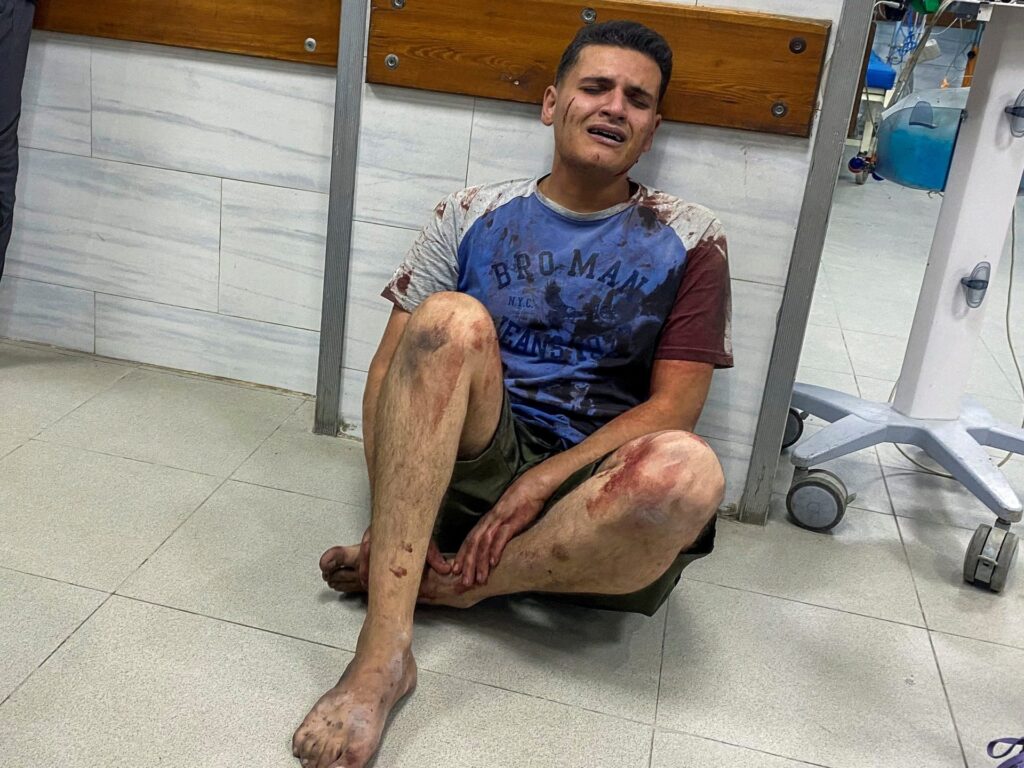“I heard you calling for someone alive, but there is no life for the one you are calling for.”
Even if a fire were blown into it, it would light up, but you blow on the ashes.”
These verses are used by Arabs to indicate that the person to whom the call is addressed does not react despite all attempts to call and seek help.
This is the situation of the people of Gaza, along with the Arab, Islamic and global world, which has done nothing about the massacres that Israel has been committing against them for more than a year.
For 10 days, the Israeli occupation state has been waging a systematic war of extermination against the people of the besieged northern Gaza Strip, despite all the appeals that the people addressed to the Arab and Islamic rulers and peoples.
But no one moved, as if what was happening in Gaza and in the north, especially, seemed to be outside the globe, according to activists from Gaza.
This silence made the people of Gaza wonder about the cheapness of their blood, as journalist Yusra Al-Aklouk released a video clip in which she sent a message to the world, in which she asked, “Are we this cheap? Is our meat this cheap?”
The journalist continues in the video, saying, “Is there anything more cruel than the sight of our meat melting and melting on a live broadcast?”
Yusra sends her message to the Arab rulers and asks them what she calls them, or what is their weak point so that they can take action. She ends the clip by saying, “We began to think about the mechanism in which we would die.”
Journalist Yusra Al-Aklouk from Gaza City.. in a message to the world: “How private are we, how cheap is our meat?” pic.twitter.com/knnAVntQBW
-Hassan Aslih Hassan (@hassaneslayeh) October 14, 2024
A video clip spread on social media platforms of a distress call from some people in northern Gaza, wearing shrouds, and saying that for 25 days no water, food, or medicine had entered them.
They added that they put on their shrouds in preparation to meet God, because they had despaired of the world and humanity.
Many calls and blog posts appeared on social media platforms showing an appeal to the people of Jabalia after they were besieged by the occupation soldiers.
Commenting, journalist Anas Al-Sharif said, “Every day we receive dozens of appeals from besieged families in northern Gaza. I made this call a short while ago with a member of the Al-Sayyid family, against whom the Israeli army committed a massacre, resulting in the death and injury of 20 people, including wounded who are still under arrest.” The rubble, in light of the inability of ambulance crews to reach them as a result of direct targeting by the Israeli occupation forces.”
Every day we receive dozens of appeals from besieged families in northern Gaza.
I made this call a while ago with a member of the Al-Sayyid family, against whom the Israeli army committed a massacre, resulting in the death and injury of 20 people, including the wounded who are still under the rubble, in light of the inability of ambulance crews to reach them as a result of the targeting… pic.twitter.com/iYFEht2oiW– Anas Al-Sharif (@AnasAlSharif0) October 14, 2024
Dr. Munir Al-Barsh published an audio clip to appeal to a family of 13 people after they were besieged in Jabalia. The clip shows the inability of the rescue teams to reach this family in which there are wounded, and the rescuer asked the rescuer not to sit in one room.
An appeal from a family of 13 people trapped in Jabalia
A call from a family of 13 people trapped in Jabalia pic.twitter.com/PGwxzAT2qt— Dr. Muneer Abdullah Al-Barsh (@Dr_Muneer1) October 14, 2024
A resident of northern Gaza wrote, “With every passing hour, Jabalia witnesses a change in its features. The sounds of explosions do not cease, leaving behind massive destruction in the neighborhoods and alleys. Buildings collapse one after another, and many times entire neighborhoods collapse due to the explosive robots, as if the camp was being reshaped from new”.
Where is the escape? Staying in homes being demolished over our heads? Siege in an area with no food, water, or medical services? Fleeing through corridors of torment and being exposed to the risk of arrest and torture? The possibility of fear, hunger, bombing fire and death in Gaza City? Staying in the hell of tents, where time passes slowly, full of humiliation, indignity, and the specter of…
– Where are we going? (@NourGaza) October 13, 2024
Regarding the massacres committed by Israel in every part of Gaza, one blogger wrote describing the scene in Deir al-Balah: “People are dying by burning, and in Jabalia they are dying under siege and bombing, and on the beach the child is dying with a morsel in his mouth, and in Nuseirat they are being torn to pieces, and in northern Gaza the parent cannot find anything to do with it.” He only had a few kilograms of minced meat.”
Some tweeters cited the old Arab proverb, “O Pharaoh, who is your Pharaoh? He said, ‘I have not found anyone to return me.’” This applies to the situation in Gaza and the war of extermination that Israel is waging against it.
What kind of world are we witnessing when a Palestinian is burned alive inside his tents?
By God, I saw this horrific scene in a frightening picture when the United States burned 8,000 Iraqi soldiers withdrawing from Kuwait to Basra…burning them with napalm. The American journalist Kenneth Garrick took the picture of one of the melted-down soldiers in the “Road Road” massacre…
– Abdo Fayed – Abdo Fayed (@Abdo_Fayed89) October 14, 2024

